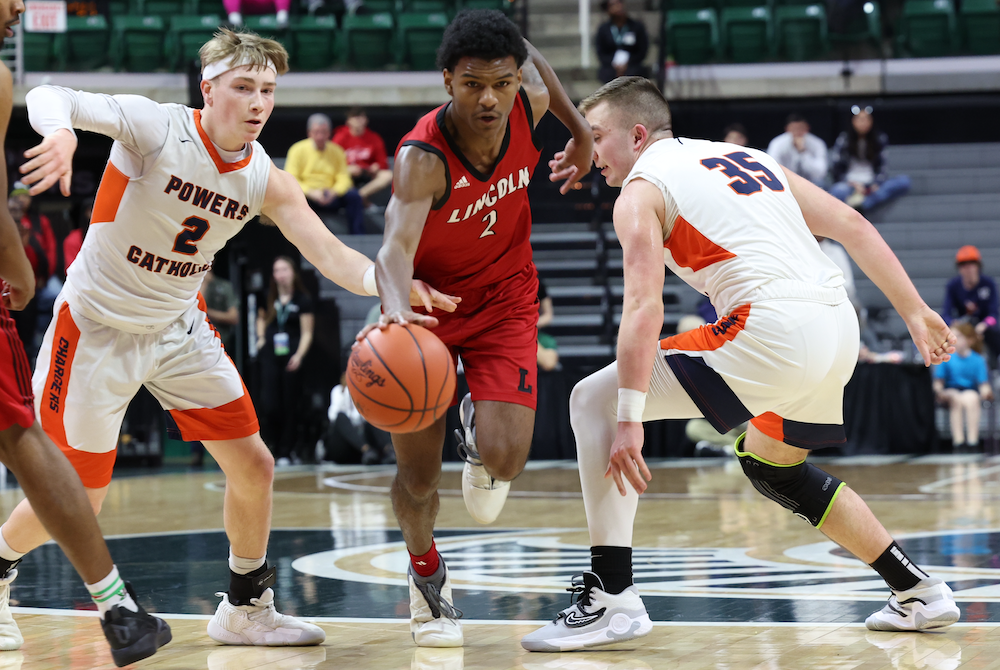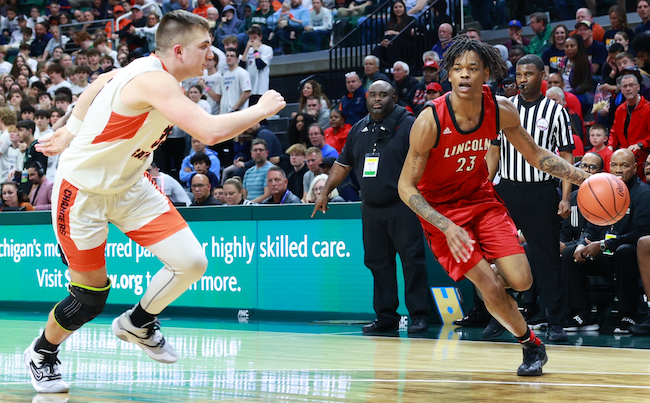
MHSA(Q&)A: Historian Ron Pesch
April 16, 2012
 When we receive a question on the history of MHSAA athletics that we can't answer on the spot, Muskegon's Ron Pesch is the first person we seek out for help.
When we receive a question on the history of MHSAA athletics that we can't answer on the spot, Muskegon's Ron Pesch is the first person we seek out for help.
Pesch took the reins as Michigan's chief high school sports historian during the mid 1990s after the retirement of legendary MHSAA record book originator Dick Kishpaugh and has contributed to various efforts and publications across the state.
One of his latest projects is the awarding of "retro" Mr. Basketball Awards. The first Hal Schram Mr. Basketball Award was given by the Basketball Coaches Association of Michigan in 1981 to Lansing Eastern's Sam Vincent. Three seasons ago, BCAM -- with research work by Pesch -- began awarding retro winners for the previous decades beginning with the 1920s. This winter, BCAM honored retro winners from 1922, 1932, 1942, 1952, 1962 and 1972.
Click to read more about those winners and the finalists recognized last month. Also, click for links to the previous retro winners. The retro Mr. Basketball project will last seven more seasons. Pesch explains more below.
How did you come up with rewarding a “Retro” Mr. Basketball?
The project came out of a conversation I had with (BCAM executive director) Tom Hursey at the basketball finals back in '99. Together, we hatched an approach honoring the state's past basketball greats. He let me run with it, while he worked on getting a subcommittee launched to make the selection.
How do you dig up all of this nomination info?
Between votes, I work on digging out the details. My initial target list always begins with all-state teams - if, of course they exist. All-tournament teams for the early years also serve as a starting point -- if they exist. Best I can tell, the Detroit Times, the Free Press and the News have all named all-state squads, at various points, back to about 1935. The Associated Press and UPI came to the game much later - somewhere around the early to mid 1960s. I then work on creating a crosstab on the players selected, noting the "teams" on which they were named (Class A 1st team, Dream Team, Class C 3rd team), and try to find quotes detailing their games. The result is really a reflection of the times and the history of newspaper reporting.
In early years, we can struggle to uncover a player’s first name, let alone his class in school. And statistical coverage of a player's abilities was very limited. It's simply the way things were back then. Everyone in town knew King Lewis, or Red Cherry, or Young Jacks. And the final box score only contained points, fouls, substitutions, as they were all you really needed to know about the game. But by visiting the state library in Lansing, and looking at a cross-section of newspapers, you can usually dig out what you need.
Do you collect from other sources as well?
Another source is high school yearbooks. Some resources have started to emerge online. I also tap into the MHSAA site and make contact with ADs around the state, asking for their assistance on digging out details - especially class in school. Like the current program, only "seniors" are considered for the award. Mid-year graduates can create a challenge, but the rule currently in place is a player is considered a nominee in the year in which he was last eligible for the state tournament. In other words, if you graduated in January or February of 1943, you would be considered for the 1942 ballot. It appears that a similar approach was used in selecting all-state teams.
|
Year |
Player |
High School |
Age |
Height |
Weight |
Year |
DFP |
DN |
DT |
AP |
UPI |
Tourney |
|
1971 A-1 G. |
Frank Tanana, Jr. (C) |
Detroit Catholic Central |
17 |
6-3 |
170 |
Sr. |
A1 |
A1 |
A1 |
A1 |
||
|
1971 A-1 C |
Tom McGill |
Flint Northern |
17 |
6-3 |
190 |
Sr. |
A1 |
DM |
A1 |
A1 |
||
|
1971 A-1 F. |
Lindsay Hairston |
Detroit Kettering |
17 |
6-9 |
203 |
Sr. |
A1 |
DM |
A1 |
A1 |
||
|
1971 A-1 F. |
Campy Russell |
Pontiac Central |
18 |
6-7 |
190 |
Sr. |
A1 |
DM |
A1 |
A1 |
That cross-tab table will help establish a list of nominees. A consensus first-team pick is an obvious candidate. When only a single all-state team is available, I'll do what I can to look up all-conference teams or all-area teams from around the state to see who else might be considered. While life after high school is not a considered when trying to pick a winner, a player who emerges as a star in college or in the pros may emerge as a candidate when you see his details in a local paper.
Bios are assembled from the newspaper reports, detailing as much as we can find on high school player's career. I'll tap into a variety of resources including old team histories when available. When needed, I'll toss out request to reporters, old and new, around the state. Local librarians and historians are another wonderful resource.
How does voting work?
Between sessions of the Boys Finals, the committee assembles to hash out a final ballot, and to make a selection. I don't vote, but I may guide the conversation and provide any additional details when needed, reminding members that we're focusing on their high school careers. The process is certainly imperfect. But the committee approach prevents the process from becoming a popularity contest. These guys have the benefit of watching many of the players play. And, like the current Mr. Basketball program, they sometimes surprise. But that's what makes it fun. And, of course, stirs the pot. It gets people talking about the history of basketball in this state.
Is there a theme to MHSAA basketball that has remained constant over the years?
For me the greatest thing about the basketball tournament is that it assembles a wide range of folks who want to see players they've heard about in action. And the process, for the most part, hasn't change since the 1920s. While the style of the game has changed, winning a title is much the same as it was back when our great-grandfathers played: You gotta get through the tournament. And only four trophies are awarded.
These guys were the "Magic" of their day. I'm hoping we never forget that.

Thanks in Part to Super Subs, Balanced Lincoln Set to Make Finals Debut
By
Steve Vedder
Special for MHSAA.com
March 15, 2024
EAST LANSING – It may be that Warren Lincoln is short on star power.
But success certainly isn't lacking.
In fact, the Abes' latest includes the chance to play in their first state championship game after surging to a 60-48 win over Flint Powers Catholic in Friday's first Division 2 Semifinal at the Breslin Center.
Warren Lincoln does have four players averaging more than nine points per game. But coach Wydell Henry said it's hard to single out a particular player as a bona fide star.
"Who is our superstar? We don't have one," said Wydell, whose team advanced to Saturday's 6:45 p.m. finale. "Sometimes a star shines through, but today it was the bench."
How impressive was the bench? Warren Lincoln's subs outscored Powers’ 27-1, with a handful of non-starters on the floor for a devastating 19-7 run over 10 minutes from the last minute of the first quarter to the 7:10 mark of the third.
It's a bench which has evolved during the season, junior guard Markus Blackwell said. Four months ago, during the opening weeks of practice, there were some roles which were up in the air. But Blackwell said those roles were quickly defined, and success followed.
"We knew in the summer we were going to have depth," said Blackwell, who led the Abes with 20 points. "We just needed to get better and learn to make shots. Everyone can score, everyone can make their shots. That's what makes it a lot of fun."
 Warren Lincoln (23-4) trailed by as much as 17-9 with 54 seconds left in the first quarter. But the Abes tied the game 20-20 on a 3-pointer by Christopher Morgan with 5:15 left in the half, then outscored Powers 17-6 in the third quarter.
Warren Lincoln (23-4) trailed by as much as 17-9 with 54 seconds left in the first quarter. But the Abes tied the game 20-20 on a 3-pointer by Christopher Morgan with 5:15 left in the half, then outscored Powers 17-6 in the third quarter.
The closest Powers came after that was 47-40 with five minutes left in the game, but back-to-back 3-pointers by Blackwell clinched the win.
Javontae Ross led Powers (22-6) with 16 points, and Connor Kelly added 14 points, eight rebounds and four assists.
Wydell said his team goes nine deep and considering the returning experience this season, he was expecting Lincoln to be a factor. The Abes finished 9-1 to claim the Macomb Area Conference White title, and all four its losses this season were to strong Division 1 teams.
"I knew we had eight back and that was going to be deep enough," he said. "I didn't know who, but we have guys who work hard. We just needed to put it together.”
Defensively, Warren Lincoln held Powers to just 40.8-percent (20 of 49) shooting from the field. The Chargers were slowed by 14 turnovers, many when it seemed they could make a run.
"Offensively, we got a little bogged down today; we couldn't find any rhythm. They scouted us well. It wasn't any particular player, we just couldn't find the hoop," Powers coach Zach Collins said. "They definitely have depth, they go about nine deep and they're huge. They go 6-5, 6-6 and can roll in a lot of guys. They can roll in a lot of guys who understand their scheme. We knew that was something we'd have to contend with."
Wydell said the game-clinching run came after a timeout in which he told the players ignore any pressure.
"We called a timeout, got together and just told the kids to relax," he said. "Hopefully it would work because we really didn't have any answers. We just had to settle down and play the right way."
PHOTOS (Top) Warren Lincoln’s Markus Blackwell (2) cuts between Flint Powers Catholic defenders Grant Garman (2) and Dempsey Cull (35) during Friday’s Division 2 Semifinal. (Middle) Jamari Culver (23) looks for an opening with Cull attempting to wall off his path. (Photos by Hockey Weekly Action Photos.)

